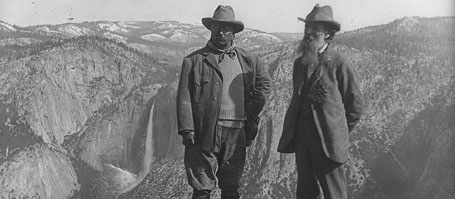
John Muir, the founder of the Sierra Club, one-time student at the University of Wisconsin, and a pioneering wilderness preservationist, knew much of the Bible by heart and spent his formative years in a renewal group that had split off from the Church of Scotland.
Although his religious faith is overlooked by most biographers, University of Wisconsin professor Calvin DeWitt says it explains much about Muir’s effusive descriptions of the natural world in his writings. He constantly drew upon and referenced scripture, catechisms and hymns, which made up "the soundtrack of his life."
Muir’s spontaneous reaction, upon seeing another natural wonder during his travels, was frequently "Praise God from whom all blessings flow," the opening line from the doxology.
Quoting a letter Muir had written to his daughter, DeWitt said that Muir encouraged her to memorize much as he had done. "Then you will go through world rich," he told her.
DeWitt, a professor in the Gaylord Nelson Institute for Environmental Studies, first stumbled upon a reference to Muir’s spirituality in the book "The Wealth of Nature," by Donald Worster. Then he went to his own bookshelves to investigate books by Muir that he had acquired through a book club, but had never read.
"I couldn’t believe what I found," he said. Descriptions and phrases that he read had a familiar liturgical ring to them.
He discovered many parallels to his own formative years in Grand Rapids, Michigan. "I was steeped in the same reform theology that John Muir was," he said. "In my church we memorized all of this stuff."
DeWitt said that Muir could recite the New Testament from beginning to end by age 11. Eventually he’d also memorized three quarters of the Old Testament.
The fact that God has revealed himself in the natural world, as well as through holy scripture, was part of the catechisms that Muir studied. It was not new theology. But for Muir it became an obsession.
DeWitt read from an 1875 article that Muir wrote from the California mountains for Harper’s magazine in which he called glaciers "scriptures…written in so plain a hand."
The Muir family’s emigration to America in 1849 was prompted by the English crown’s efforts to reassert control over the Church of Scotland, according to DeWitt. The family had been part of the Secession Church, which was founded by Ebenezer Erskine. Originally headed for Canada, Muir’s father changed course when he heard a Boston merchant exclaim that all of the wheat he’d been buying came from Wisconsin.
They settled at Fountain Lake, about 12 miles north of Portage, where young John found nature all around him. DeWitt said that upon Muir’s death in 1916 one of his friends remarked that Muir had learned from his father that all of the works of nature are the works of God.
Calvin DeWitt’s lecture on "The Spiritual Journey of John Muir" was the first event in a series of activities this weekend, called Geneva Forum. The Forum is sponsored by the Bradshaw-Knight Foundation, Geneva Campus Church, New College Madison, InterVarsity Faculty and Graduate ministries, and the Isthmus Society.
Another lecture by Calvin DeWitt, "Evangelicals and Scientists: A New Consensus on Caring for Creation" will be held at 7:30 tonight (Friday, February 9th) at the State Historical Society Auditorium, 816 State Street Mall.
For more information, check New College Madison.
John Muir/Teddy Roosevelt photo, Public Domain, via wikimedia commons

